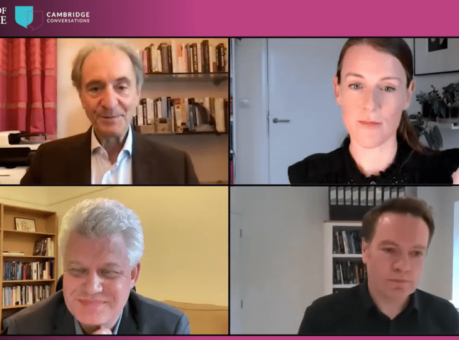
By Dot Dot Dot founder, Katharine Hibbert
“The thing about entrepreneurship – and particularly social entrepreneurship – is that it matters for society, it matters for the economy – and, most of all, it’s fun.” That was the overall conclusion reached in a Cambridge University panel discussion I was part of recently, chaired by the university’s acting Vice Chancellor Dr Anthony Freeling, alongside Professors Andy Neely and Paul Tracey. You can listen to a recording of the conversation here.
As a panel, we agreed that social enterprises – understood as businesses where social purpose takes priority – have an important role to play in solving some of the urgent problems facing us today. Prof. Tracey, a Professor of Innovation and Organization at Cambridge Judge Business School and the Co-Director of the Cambridge Centre for Social Innovation, described the growth in interest in entrepreneurship and social entrepreneurship he’d seen since he became a lecturer in social innovation at Cambridge in 2003, along with the normalisation of social enterprises combining profit with purpose.
Prof. Neely, who is Pro-Vice-Chancellor for Enterprise and Business Relations at Cambridge, looked at the situation from the other perspective – as an academic whose focus is on conventional business, he described the shift he’d seen in commercial businesses towards a greater sense of purpose – a phenomenon he ascribed to a generational change, as younger people want to use their careers to make a difference.
My own experience over the past 12 years of working on Dot Dot Dot backed up the academic perspectives, and I highlighted the need for social customers as well as social entrepreneurs. Whilst social entrepreneurs are necessary to create businesses that make a difference, they aren’t sufficient, I argued. Social entrepreneurs need customers who value the ways in which they do things differently, and who are prepared to pay for the services and products they sell. This has shaped Dot Dot Dot’s success – we thrive when we work with property owners who value our high standards and want to see their buildings used to support residents and communities, and when we work with property guardians who welcome our support and encouragement to volunteer, so choose our housing rather than that provided by one of our competitors. No social enterprise can succeed by imposing its vision of a better future – unlike charities or government services, we are offering a product in a market, so customers can always go elsewhere, and Dot Dot Dot exists thanks to those who choose our approach.
As a panel, we also talked about approaches to scale and profitability within the social enterprise sector. Prof. Tracey discussed the successful models he’d seen where social enterprises are highly focused on a single geographical area, or who spread their impact by spreading their ideas rather than growing their businesses. I agreed, flagging Safe Soulmates, a platform to allow adults with learning disabilities in Cambridgeshire to meet new friends or people to date, as an example of a small but useful organisation, whose hands-on approach may limit its potential reach in a way that its founders accept.
However, I also emphasised the value of impactful businesses which are highly ambitious for scale, and which need substantial investments to get there – meaning that they must deliver significant financial returns to repay risk-taking investors. I used Fairphone as an example – as a business which aims to reduce the environmental impact of electronics by building the greenest mobile phones on the market, Fairphone needs to be big enough to displace sales of more polluting gadgets built with conflict minerals, and can only achieve that by attracting investors who believe they will make money as well as see impact. Profitability, I argued, can enable impact and scale, and should be celebrated.
As a panel, we also agreed that social enterprise isn’t a panacea – many problems can’t be solved by a profitable business model. A celebration of social enterprise can sit alongside recognition of the importance of charities and local and national government, who deliver essential services for which there is no market.
Finally, we discussed the advice we’d give to would-be social entrepreneurs setting out on the journey to starting a business. I encouraged those with an idea to start taking the first steps along the path, even if they didn’t yet know all the answers or have all the resources they’d need available – my experience has been that solutions and help present themselves as you go, and that it’s very hard to predict ahead of time which challenges will be easy to deal with and which will be hard. Prof. Tracey emphasised the range of help available to start-ups, including from his department and from Cambridge University as a whole. Finally, Prof. Neely said ‘go for it’ – and have fun and enjoy it along the way.


